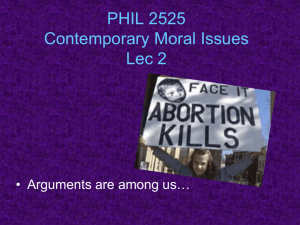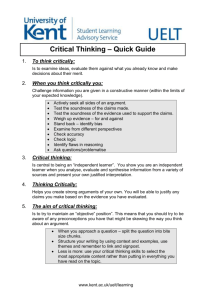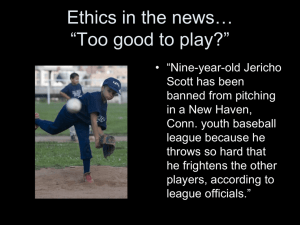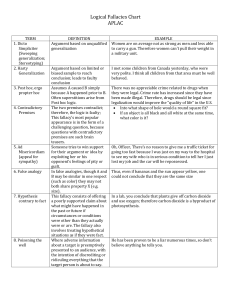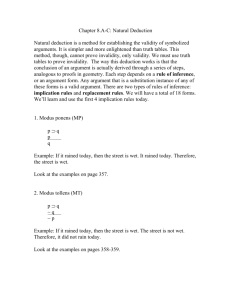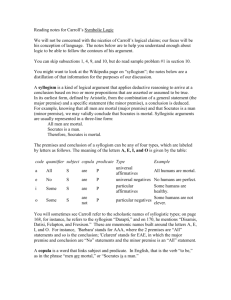PHIL 2525 Contemporary Moral Issues
advertisement
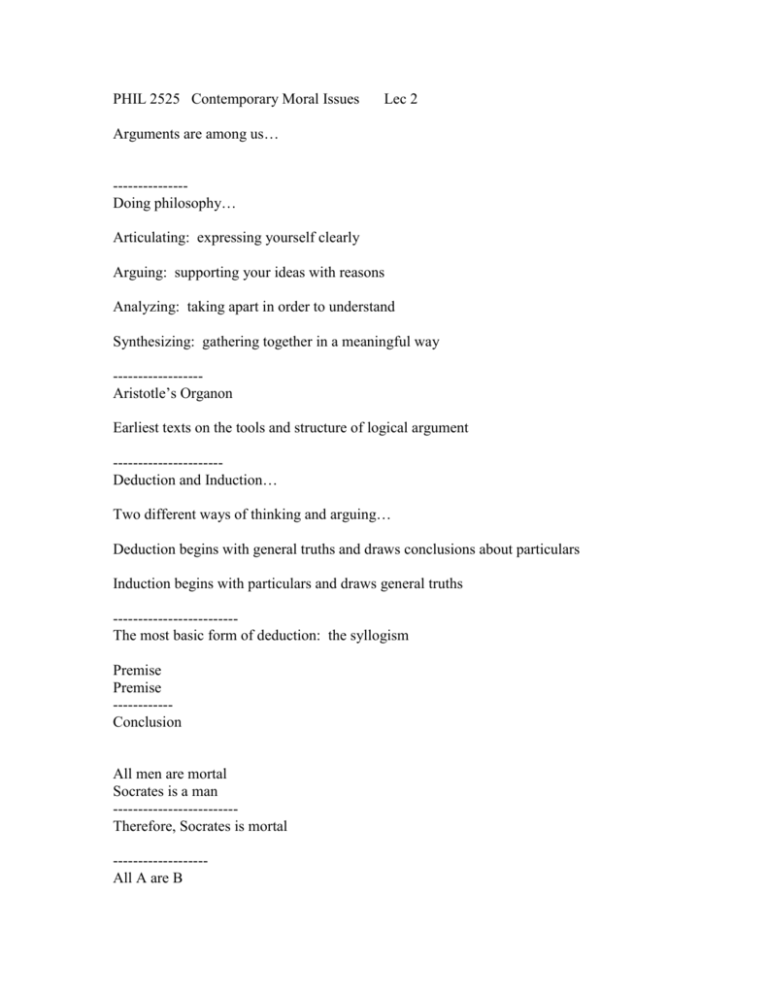
PHIL 2525 Contemporary Moral Issues Lec 2 Arguments are among us… --------------Doing philosophy… Articulating: expressing yourself clearly Arguing: supporting your ideas with reasons Analyzing: taking apart in order to understand Synthesizing: gathering together in a meaningful way -----------------Aristotle’s Organon Earliest texts on the tools and structure of logical argument ---------------------Deduction and Induction… Two different ways of thinking and arguing… Deduction begins with general truths and draws conclusions about particulars Induction begins with particulars and draws general truths ------------------------The most basic form of deduction: the syllogism Premise Premise -----------Conclusion All men are mortal Socrates is a man ------------------------Therefore, Socrates is mortal ------------------All A are B C is an A Therefore, C is a B All men are mortal Socrates is a man Therefore, Socrates is mortal ------------------------Not all arguments are so sweet and simple… All A are B C is an A -------------------Therefore, C is a B All Catholics are famous The Pope is Catholic ------------------------Therefore, the Pope is famous Validity? Truth? Soundness? ------------------------A syllogism can be valid, even when not true The form can be valid, even when the content is false ----------------------What about this? The Earth goes around the sun The moon goes around the Earth ---------------------------------------The Earth is part of the solar system Validity? Truth? Soundness? --------------------A syllogism can have all true statements and a true conclusion but still not be sound. Soundness requires both truth and validity --------------------Sometimes one of the premises is assumed… Men can’t give birth Therefore, Terry can’t give birth (the assumed premise is...) Truth? Validity? Soundness? ---------------------What is the assumed premise here? Abortion is killing people Therefore, abortion is wrong Truth? Validity? Soundness? ---------------------Validity and Truth = Soundness Validity has to do with the form of the argument -- the shape -- the evidentiary relationship -- the way the parts fit together Truth (or falsity) has to do with the content Soundness requires both validity and truth ---------------------You might wonder… What is the point of a deductive argument if the form can be valid, but the conclusion false? The deductive argument is important because if the premises can be shown to be true, and the form is valid, then the conclusion must be accepted… ---------------------------Induction is less certain than deduction, but… Knowledge grows from induction in a way that it can’t from deduction. Science is organized, methodical induction Advances in medicine or physics proceed induction by induction -------------------The conclusion of an inductive argument always goes beyond the premises… ------------------Inductive uncertainty… The 3,000 people who were tested reacted adversely to the new drug Therefore, the new drug should not be approved for general use What is the unstated premise here? ----------------------Moral Skepticism the idea that there is no right or wrong about moral issues not merely that we don’t or can’t know, but that there is no right or wrong … no objective truth… ---------------------- The Cultural Differences Argument: People in different cultures disagree about moral right and wrong So, therefore there is no knowing -----------------------The Cultural Differences Argument: Example: In some societies, , such as among the Eskimos, infanticide is thought to be morally acceptable. In other societies, such as our own, infanticide is thought to be morally odious -------------------------------------------------------------------------Therefore, infanticide is neither objectively right nor objectively wrong: It is merely a matter of opinion that varies from culture to culture --------------------------The Cultural Differences Argument: Rachels offers an analogous argument…. In some societies, the world is thought to be flat In some societies, the world is thought to be round ------------------------------------------------------------------Objectively speaking, the world is neither flat nor round. It is merely a matter of opinion that varies from culture to culture. -----------------------The Provability argument If there were any such thing as objective truth in ethics, we should be able to prove that some moral opinions are true and others false But in fact, we cannot prove which moral opinions are true and which are false. -----------------------------------------------------------------------Therefore, there is no such thing as objective truth in ethics. -----------------------
